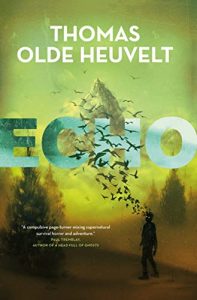Gabino Iglesias Reviews Echo by Thomas Olde Heuvelt
 Echo, Thomas Olde Heuvelt (Tor Nightfire 978-1-250-75955-9, $29.99, 416pp, hc) February 2022.
Echo, Thomas Olde Heuvelt (Tor Nightfire 978-1-250-75955-9, $29.99, 416pp, hc) February 2022.
Reviewing the work of Thomas Olde Heuvelt is no easy task, and Echo, his latest, is no different. Translated from the Dutch by Moshe Gilula, this is a complex, creepy, atmospheric, labyrinthine monster that comes in at more than 400 pages.
Echo by Thomas Olde Heuvelt is a novel about many things; grief, trauma, unconditional love, murder, creatures from the dark, eerie birds, and alpinism. That said, it is also about something else, something stranger than all those things put together: ‘‘This is the story of a possession.’’ But we’re not talking about demonic entities or evil spirits here, we’re talking about a mountain.
Nick Grevers, a travel journalist and talented mountaineer, wakes up in the hospital with his face destroyed and part of it missing. He is confused, unable to speak due to his injuries, and has his entire face wrapped in bandages. Next to him is his boyfriend Sam Avery, simultaneously worried about him and scared about what Nick might look like under all those bandages. As Nick starts to get a sense of where he’s at and what happened to him, he learns that Augustin, his climbing partner, is missing and presumed dead. Nick says he doesn’t remember much of what went down on the mountain he and Augustin were climbing, a rough, remote peak in the Swiss Alps known as the Maudit, but the truth is he remembers everything. He remembers the journey up the mountain. He remembers feeling like he and Augustin weren’t alone up there. He remembers Augustin screaming and plummeting to his death. Once Nick gets back home, things get weird. There’s something haunting him, something that makes him want to dwell in the cellar and keep his face hidden. Sam notices and worries about him, but things take a turn for the worse when he tries to get a peek at Nick’s face and finds a crevasse there, one full of dark birds and a creature trying to claw its way out of his boyfriend’s face.
The preceding synopsis manages to talk through only about 30% of the narrative. Echo, which is narrated mostly by Sam and Nick, is expansive and intricate. As in all of Heuvelt’s novels, there is a lot going on here: Sam’s past, what Nick experienced on the mountain, the way the accident – which wasn’t an accident – affects their relationships, and much more. Sam is afraid of his future with Nick, but also afraid of Nick himself. After returning home, Nick is a different man. There are plenty of reasons for Sam to be afraid. Things go from Nick being weird and hiding away all the time, to Sam waking up with steel wire wrapped around his face, to Sam being blown out of bed and across the room by an explosion that came from Nick’s face right before dark birds started coming out of it. And these events take place over one or two chapters.
Despite the plethora of events and intertwined narratives and ideas in this novel, which make it a bit of a challenging read, Echo triumphs because Heuvelt gives Nick and Sam very unique voices and they carry the narrative well. There is a lot of fear, grief, confusion, and darkness, but also moments of humor that allow readers to breathe, collect themselves, and delve back into the eerie weirdness. There are also lots of elements, like mentions of bags, social media, Chuck Palahniuk, Inglourious Basterds, Agatha Christie, The Cabin in the Woods, The Last House on the Left, that pull the story into the real world from time to time and give the strange stuff even more of a punch. That’s not the end of it. Echo is one of those novels that establishes a dialogue with great horror narratives that preceded it. That happens here with work by Stephen King, Shirley Jackson, William Peter Blatty (of course!), and Clive Barker.
While this is clearly a horror novel that packs in supernatural occurrences, touches of cosmic horror, and possession, it is also mainly a narrative about guilt, grief, and fear that has trauma – both physical and emotional – at its core.
Heuvelt is a great storyteller, and Echo might just be his best work yet. For example, Nick is a truly memorable character. He is a victim and a monster, a man forced to live with a horrifying accident and also someone who’s possessed by a mountain. We feel empathy for him, but also fear him because he is what he appears to be but also more…and he might be something even worse, which is a possibility Sam understands very well: ‘‘How could I be sure it really was Nick sitting there and not some other being impersonating him, some thing that looked like Nick, had the same hands, wore the same sweatpants, but was actually something totally alien? It didn’t use words Nick would use. Didn’t smell like Nick. When the mask came off, it wouldn’t even have Nick’s face.’’
Echo is a literary maze, and like any other maze, it takes effort to get to the end of it. Fans of horror looking for a quick, easy-to-digest, pulpy read should stay away from this cold mountain of a book, but readers looking to get submerged in a gripping, bizarre narrative should immediately delve – or climb? – this one.
Gabino Iglesias is a writer, journalist, professor, and book reviewer living in Austin TX. He is the author of Zero Saints and Coyote Songs and the editor of Both Sides. His work has been nominated to the Bram Stoker and Locus Awards and won the Wonderland Book Award for Best Novel in 2019. His short stories have appeared in a plethora of anthologies and his non-fiction has appeared in the New York Times, the Los Angeles Times, and CrimeReads. His work has been published in five languages, optioned for film, and praised by authors as diverse as Roxane Gay, David Joy, Jerry Stahl, and Meg Gardiner. His reviews appear regularly in places like NPR, Publishers Weekly, the San Francisco Chronicle, Criminal Element, Mystery Tribune, Vol. 1 Brooklyn, the Los Angeles Review of Books, and other print and online venues. He’s been a juror for the Shirley Jackson Awards twice and has judged the PANK Big Book Contest, the Splatterpunk Awards, and the Newfound Prose Prize. He teaches creative writing at Southern New Hampshire University’s online MFA program. You can find him on Twitter at @Gabino_Iglesias.
This review and more like it in the July 2022 issue of Locus.
 While you are here, please take a moment to support Locus with a one-time or recurring donation. We rely on reader donations to keep the magazine and site going, and would like to keep the site paywall free, but WE NEED YOUR FINANCIAL SUPPORT to continue quality coverage of the science fiction and fantasy field.
While you are here, please take a moment to support Locus with a one-time or recurring donation. We rely on reader donations to keep the magazine and site going, and would like to keep the site paywall free, but WE NEED YOUR FINANCIAL SUPPORT to continue quality coverage of the science fiction and fantasy field.
©Locus Magazine. Copyrighted material may not be republished without permission of LSFF.







